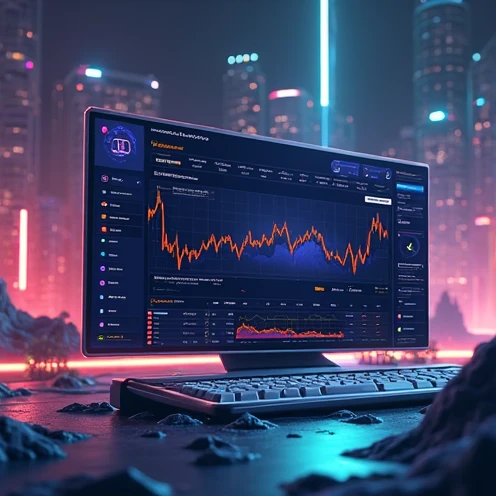What Are Trading Platforms and Why They Matter
Trading platforms are essential tools in today’s digital investing world. They allow users to buy and sell financial instruments—such as stocks, forex, and crypto—within seconds. Without them, trading would still require phone calls to brokers and tons of paperwork.
Iklan Google AdSense
Thanks to these platforms, even beginners can access global markets with ease. Whether it’s a mobile app or a desktop terminal, the goal is the same: to provide fast, secure, and insightful ways to trade.
The Shift from Traditional to Digital Trading
Previously, trading was a privilege for institutions and professionals. But now, platforms have brought accessibility to the masses. With just a few taps, anyone can open positions, track markets, and manage portfolios from anywhere.
Iklan Google AdSense
The move from physical exchanges to digital trading has also introduced new conveniences like automated trading, real-time charting, and integrated news feeds.
From Data to Execution: How Platforms Operate
Trading platforms are more than interfaces—they connect directly with market exchanges. They collect live data, provide it to users, and send orders in milliseconds. Speed and reliability are crucial.
Behind the scenes, these platforms rely on complex infrastructure. While users see a clean dashboard, a lot is happening in the background to process trades accurately and securely.
Why Beginners Love Modern Platforms
New traders often feel overwhelmed, but many platforms now include tutorials, demo accounts, and guided tools to ease the learning curve. This makes it possible to learn by doing—without risking real money at first.
Additionally, most platforms offer easy-to-understand metrics, profit/loss calculators, and risk management settings tailored for novices.
Trading Platforms: Popular Examples You Might Know
Names like MetaTrader, eToro, Robinhood, and Interactive Brokers have become household names among investors. Each offers unique features, from copy trading to AI-driven analysis.
Choosing the right platform depends on your goals. If you prefer forex, MetaTrader might suit you. For stock investments and community insights, eToro shines.
Types of Platforms: From Web to Mobile to Desktop
There are three main formats: web-based platforms that work in browsers, desktop apps for more advanced features, and mobile platforms that offer convenience on the go.
Many professional traders use all three in tandem. For example, they may analyze charts on desktop, monitor trades on mobile, and execute from web terminals.
Features That Define a Great Trading Platforms
Key features to look for include real-time quotes, technical indicators, fast order execution, and good customer support. A laggy or cluttered interface could lead to poor trading decisions.
Also, integration with financial news sources and tools like TradingView can enhance your research and strategy development.
Don’t Ignore Customization Options
Platforms that let you customize dashboards, create watchlists, and set alerts provide a competitive edge. Tailored layouts improve focus and decision speed.
Custom indicators and plugins are another benefit. Platforms like MT4 allow traders to install custom-built algorithms or scripts for personalized strategies.
Trading Platforms: Costs and Commissions to Watch For
Each platform comes with a fee model. Some charge commissions per trade, while others rely on spreads. Hidden fees like inactivity or withdrawal charges can affect your bottom line.
Free platforms may seem appealing, but always read the fine print. Low-cost doesn’t always mean better value—especially if the tools are lacking.
How to Pick the Best Trading Platform for You
Start by evaluating your goals. Day traders need real-time speed, while long-term investors prioritize ease of use and research tools. Don’t just go for popularity—go for fit.
Check user reviews, test the demo version, and evaluate customer service responsiveness. You want a platform that not only performs but also supports your learning.
Safety First: Regulations and Security Measures
Always ensure your chosen platform is licensed by a recognized financial regulator like the SEC, FCA, or ASIC. This ensures your funds and data are protected by law.
Additional security layers—like two-factor authentication, encryption, and segregated accounts—are essential. Don’t overlook these details.
Red Flags to Avoid
If a platform guarantees profits, lacks a verifiable license, or has a confusing interface—proceed with caution. Scams often target new traders with unrealistic promises.
Trustworthy platforms will always disclose their fees, trading conditions, and security policies. Transparency is non-negotiable.
Trading Platforms: Getting Started with Demo Accounts
Most platforms provide free demo accounts where you can practice with virtual money. This is a fantastic way to test features, understand market behavior, and develop your strategy risk-free.
Use your demo account to simulate real conditions—set stop losses, experiment with indicators, and evaluate your emotions during trades.
Strategies That Work Well with Platforms
Common strategies include trend-following, breakout trading, and scalping. Some platforms allow for automation, letting you set bots to trade based on your strategy.
Don’t forget to use risk-management tools. Features like stop-loss, take-profit, and trailing stops can be set directly from your trading panel.
Avoid These Beginner Mistakes
One major error is trading without a plan. Without strategy, you’re gambling—not investing. Another mistake is over-leveraging, which magnifies both profit and loss.
Stick to your plan, use proper position sizing, and keep emotions in check. Most platforms offer journal features—use them to reflect and improve.
Trading Platforms: The Future of Trading Platforms
Expect more AI integration, voice-command functionality, and even AR-based charting in the near future. Platforms will become more intuitive, predictive, and personalized.
Also, expect tighter regulations to make trading safer and more transparent. Those who adapt early will have a major advantage.
Final Thoughts Before You Start
Trading platforms are more than tools—they’re your trading partner. Choose wisely, learn continuously, and never stop refining your skills.
With the right mindset, platform, and strategy, you’ll be well-equipped to navigate the financial markets successfully.
Iklan Bersponsor Google

